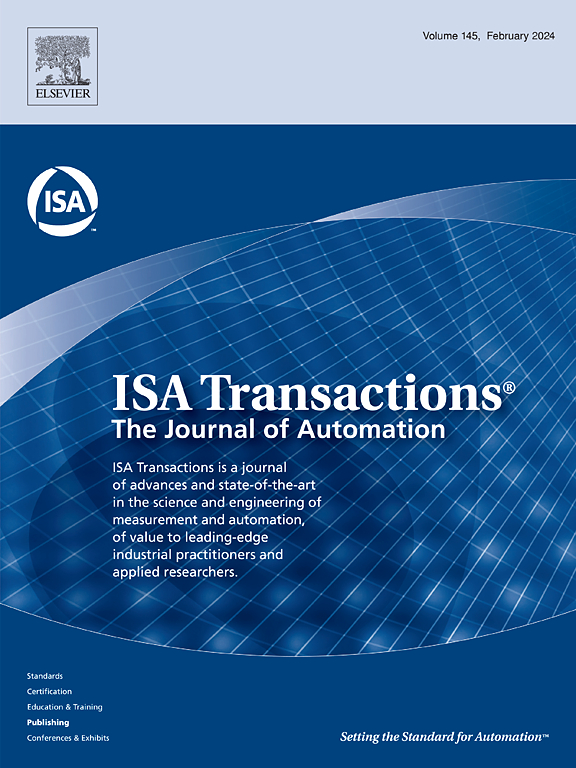Adaptive RISE-based tracking control of uncertain nonlinear systems: A FAS approach
IF 6.3
2区 计算机科学
Q1 AUTOMATION & CONTROL SYSTEMS
引用次数: 0
Abstract
A fully actuated system (FAS) approach integrated with adaptive robust integral of the sign of the error (ARISE) feedback control strategy is proposed for multi-input multi-output nonlinear systems in the presence of both external disturbances and parametric uncertainties. Owing to an inability to eliminate unmeasured disturbances and model inaccuracies simultaneously, the existing results based on the FAS approaches are typically limited to the uniformly ultimate boundedness of the tracking errors. To achieve the asymptotic tracking performance confronted with parametric uncertainties and time-varying disturbances, an ARISE feedback controller with desired compensation is synthesized to suppress the adverse effects arising from nonlinearity and uncertainty of the system. The improvements compared to the traditional RISE feedback control are attributed to two aspects: (i) the feedback gains in the RISE term are adjustable-online without having to know the prior bounds of disturbances and their time derivatives; (ii) a desired compensation-based adaptive feedforward term, primarily employing the desired trajectories in place of the measured states, could weaken the underlying interaction between the adaptive compensation and robustness part. A rigorous stability analysis is provided to demonstrate that the system state can asymptotically track a bounded desired trajectory in spite of bounded disturbances and parametric uncertainties. Comparative simulations on an under-actuated planar manipulator, possessing an equivalent multi-order FAS model, have been conducted to verify the effectiveness and merits of the developed controller. Experimental validation on a two-wheeled self-balancing robot is also provided to show the feasibility of the proposed approach.
基于 RISE 的不确定非线性系统自适应跟踪控制:FAS 方法
针对同时存在外部干扰和参数不确定性的多输入多输出非线性系统,提出了一种与自适应鲁棒误差符号积分(ARISE)反馈控制策略相结合的全作用系统(FAS)方法。由于无法同时消除未测量干扰和模型不准确性,基于 FAS 方法的现有结果通常局限于跟踪误差的均匀终极约束性。为了在参数不确定性和时变扰动的情况下实现渐近跟踪性能,我们合成了一种具有期望补偿功能的 ARISE 反馈控制器,以抑制系统的非线性和不确定性带来的不利影响。与传统的 RISE 反馈控制相比,ARISE 反馈控制有两方面的改进:(i) RISE 项中的反馈增益可在线调整,而无需知道扰动的先验边界及其时间导数;(ii) 基于期望补偿的自适应前馈项主要采用期望轨迹代替测量状态,可削弱自适应补偿和鲁棒性部分之间的潜在相互作用。严谨的稳定性分析表明,尽管存在有界干扰和参数不确定性,系统状态仍能渐近地跟踪有界的期望轨迹。为了验证所开发控制器的有效性和优越性,还在一个具有等效多阶 FAS 模型的欠驱动平面机械手上进行了对比模拟。此外,还在一个双轮自平衡机器人上进行了实验验证,以说明所提方法的可行性。
本文章由计算机程序翻译,如有差异,请以英文原文为准。
求助全文
约1分钟内获得全文
求助全文
来源期刊

ISA transactions
工程技术-工程:综合
CiteScore
11.70
自引率
12.30%
发文量
824
审稿时长
4.4 months
期刊介绍:
ISA Transactions serves as a platform for showcasing advancements in measurement and automation, catering to both industrial practitioners and applied researchers. It covers a wide array of topics within measurement, including sensors, signal processing, data analysis, and fault detection, supported by techniques such as artificial intelligence and communication systems. Automation topics encompass control strategies, modelling, system reliability, and maintenance, alongside optimization and human-machine interaction. The journal targets research and development professionals in control systems, process instrumentation, and automation from academia and industry.
 求助内容:
求助内容: 应助结果提醒方式:
应助结果提醒方式:


